On a recent segment of CNN’s “News Central,” senior political data reporter Harry Enten discussed the political landscape leading up to the upcoming election, highlighting the stalled campaign of Vice President Kamala Harris and the increasing popularity of former President Donald Trump. Enten noted that Trump, contrary to expectations that he would lose support over time, is actually more popular now than he was during the same points in the 2016 and 2020 campaigns. This observation sets the stage for a complex dynamic in which Harris and her campaign may struggle to understand why Trump’s popularity appears to be on the rise despite his prior controversies.
Enten suggested that the apparent surge in Trump’s popularity poses a challenge for Harris, who previously enjoyed a boost in her own approval ratings after becoming the presumptive Democratic nominee. He outlined how Harris’s popularity had fluctuated significantly over a few months, noting a stark improvement from -15 points in July to a positive position just a month prior, only to see her approval rating decline once again to -1. This trajectory indicates not only a lack of momentum for Harris’s campaign but also invites questions about the strategies her team may employ to regain favorable public perception in a challenging electoral environment.
The discussion also brought to light an essential point about the nature of popularity within the context of American elections. Enten emphasized that while Joe Biden and Hillary Clinton were both more popular than Trump at certain points in their respective campaigns, both candidates faced difficulties securing victory despite their favorable ratings. This reality underscores a crucial takeaway—that being more popular than Trump does not necessarily guarantee electoral success. The analysis suggests that other factors beyond popularity, such as voter turnout, campaign strategies, and the political landscape, play an instrumental role in determining electoral outcomes.
In light of these insights, Enten highlighted a potential shift in Harris’s campaign tactics, suggesting that the increasing popularity of Trump might lead to a sharpening of attacks against him. This approach could be seen as a response to the campaign’s need to reassess its strategy in the face of evolving voter sentiments. By intensifying their critiques of Trump, Harris’s team might hope to counteract the former president’s burgeoning appeal and reclaim momentum in the race.
Additionally, Enten’s commentary hints at the broader implications for the Democratic Party as it prepares for the election. The revelation that Trump has retained or even grown his support raises pressing questions for Democrats about how to effectively engage voters who may be swayed by Trump’s messaging and persona. As Harris and the Democratic apparatus assess their strategies going forward, understanding the reasons behind Trump’s sustained popularity could be crucial in crafting a message that resonates with the electorate.
Ultimately, the outcome of the 2024 election may hinge on how well candidates can navigate the challenges presented by the current political climate. Enten’s observations serve as a reminder to both parties that achieving popularity is only part of the equation; it must be complemented by a strategic approach to connecting with voters and addressing their concerns. As the election approaches, the stakes for both Trump and Harris are high, making the understanding of public sentiment and electoral dynamics more critical than ever for campaign success.

